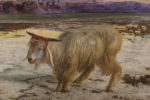The Paradox Par excellence
The desert sun burns John’s body. His fiery longing for the kingdom burns like a flame in his soul. He is, definitely, the foreteller of fire. In the Messiah, soon to appear, he sees the Master of flame. The New King will be a fierce husbandman. Every tree, which does not bear the good fruits, is cut down and cast into the fire. He will, thoroughly, purge His floor and collect
His wheat into the barn. Surely the chaff will be burned up with unquenchable fire. A baptizer, he will baptize with fire too.
Rigid, wrathful, harsh, rough and coarse, quick to insult, impatient and impetuous, John was extremely strict with the aspirants. To him the Pharisee and the publican were just on a par with each other. He took no pride in having drawn any of them to the first step of repentance. When the learned and notable came (Pharisee and the Sadducees who came to be baptized) not only did he not take any special note of them, but shamed them left and right.
“When the crowds came to John for baptism, he said, “You brood of snakes! Who warned you to flee the coming wrath? Prove by the way you live that you have repented of your sins and turned to God. Don’t just say to each other, ‘We’re safe, for we are descendants of Abraham.’ That means nothing, for I tell you, God can create children of Abraham from these very stones. Even now the ax of God’s judgment is poised, ready to sever the roots of the trees. Yes, every tree that does not produce good fruit will be chopped down and thrown into the fire.
The crowds asked, “What should we do?”
John replied, “If you have two shirts, give one to the poor. If you have food, share it with those who are hungry.”
Even corrupt tax collectors came to be baptized and asked, “Teacher, what should we do?”
He replied, “Collect no more taxes than the government requires.”
“What should we do?” asked some soldiers.
John replied, “Don’t extort money or make false accusations. And be content with your pay.” (Lk. 3:7-14)
In sum, he is telling everyone: “Change your life. Change it to doing the very opposite of what you do now, if you do not wish to be burned up by Him. If you do change He will baptize you with fire and the Holy Spirit. Change your very life and attitude right now. Humble yourselves and share all that you have with those who do not have them. He will change “stone” into flesh and blood, while you do the very opposite.
However, John becomes common place when he descends to particulars. He too remains on the fringes, falling in line with the Pharisean tradition. His advice in effect, is, just to give alms, to give away the superfluous. From the publicans he only asks for justice. Let them take only what has been allotted to them, and nothing more. He exhorts the soldiers: “Be satisfied with your pay and never rob.” When all is said and evaluated, this is nothing more or less than the so-called Mosaic Law. Long, long before him Amos and Isaiah had gone much further.
Now is the time for the precursor to give way to the long-expected Liberator par-excellence of the Sea of Tiberias. Of course the precursor’s lot is really hard. He knows but is not permitted to see. He just arrives on the banks of the Jordan, but does not enter or enjoy the promised land. He makes plain the path for Him who comes after him. He can never pass through the path. He prepared the throne, but never sits on it. He is ever the servant of the master whom, “he does not even see face to face. Nevertheless, John’s fierceness may be justified by his consciousness of being just an ambassador and nothing more. This consciousness is not at all envious, though it leaves a tinge of sadness, even in his genuine humility. He fankly admits that he is neither Elijah nor any of the prophets and much less, Christ. He admits: “I am the voice of the one crying in the desert. I just baptize you with water. But He who comes after me mightier than I. I am not worthy even to untie the latchet of His shoes”. At Nazareth, in the meantime, the Son of Man is lacing up His shoes with His own most holy hands. This was in preparation for His sojourn in the wilderness.


